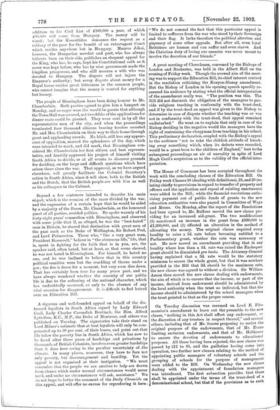The'House of Commons has been occupied throughout the week with
the concluding clauses of the Education Bill. On Friday week Clauses 18 (dealing with definitions), 19, and 20 (re- lating chiefly to provisions in regard to transfer of property and officers and the application and repeal of existing enactments) were added to the Bill; while the financial resolutions autho- rising payment out of public funds of grants to the new education authorities were also passed in Committee of Ways and Means. On Monday, after the report of the Resolutions had been agreed to, Mr. Balfour moved the new clause pro- viding for an increased aid-grant. The two modifications (1) sanctioned an increase in the grant from £930,000 to £1,300,000, and (2) effected an alteration in the method of allocating the money. The original clause required every locality to raise a 3d. rate before becoming entitled to a Parliamentary grant, whether the rate was necessary or not. He now moved an amendment providing that in any locality where less than a 3d. rats was raised the Exchequer grant should be diminished pro lento. The Attorney-General having explained that a 3d. rate would be the statutory minimum to secure the whole grant, but that it was nowhere provided in the Bill that 3d. should be the maximum rate, the new clause was agreed to without a division. Sir William Anson then moved the new clause dealing with endowments, the aim of which is to ensure that the income, or part of the income, derived from endowment should be administered by the local authority when the trust so indicated, but that the income should be administered by the school managers when the trust pointed to that as the proper course.










































 Previous page
Previous page